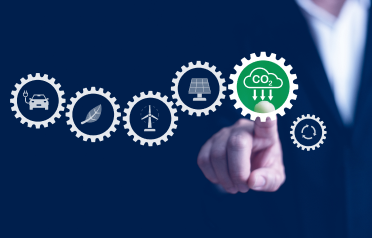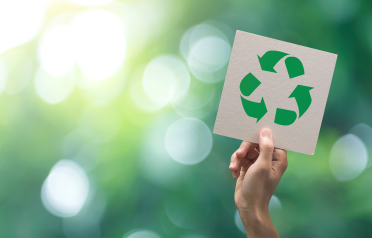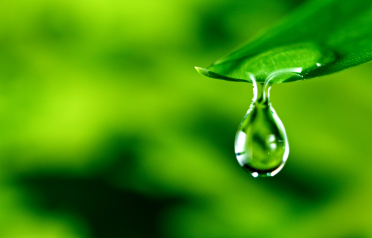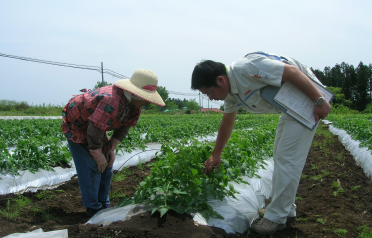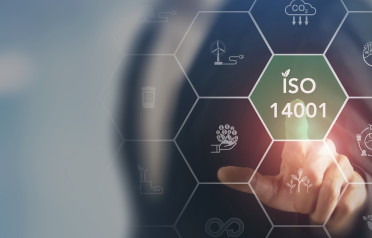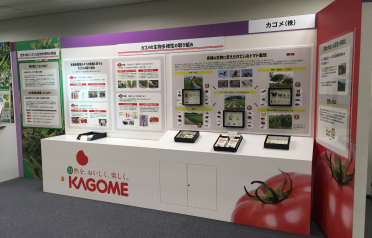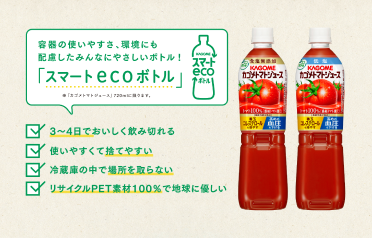



環境に配慮した商品
カゴメは環境負荷の低い商品容器・梱包資材への切り替えや、環境に優しい生鮮野菜商品の栽培方法の確立に注力しています。持続可能な資源を用いたものづくり・商品の提供によって、サステナブルな社会の実現に貢献していきます。
FSC®認証紙パック
FSC®(Forest Stewardship CouncilR:森林管理協議会)は、木材を生産する森林と、その森林から切り出された木材の流通や加工の過程を認証する制度を管理する国際的な機関です。
FSCマークが入った製品を選択して購入いただくことで、海外で生産された木材であっても、環境や社会に大きな負荷をかけずに生産された製品(木材)を選択できるような仕組みになっており、世界の森林保全を間接的に応援できます。
カゴメは2014年9月からFSCマークのついた紙パック飲料を使用しています。


環境に配慮した紙製飲料容器
通販商品やギフトセット商品の飲料容器において、環境配慮型紙製飲料容器の「カートカン」を積極的に採用しています。このカートカンは間伐材を含む国産材を30%以上使用しているため、「植える→育てる→収穫する」というサイクルがスムーズに循環し、日本の森林を守り育てることにつながります。
また、飲用後のリサイクルを進めるため、リサイクル方法をカゴメホームページに掲載しています。

植物由来素材のキャップ・ストロー
2020年4月から紙容器飲料のプラスチックキャップ及びリングを、100%植物由来素材(サトウキビ由来)に切り替えています。また、紙容器飲料に添付しているプラスチックストローは、2020年4月から、植物由来素材を5%配合したストローへ順次切り替えています。

100%リサイクル素材のペットボトル
2022年9月から「カゴメトマトジュース食塩無添加」及び「カゴメトマトジュース低塩」(720ml)のペットボトル容器を、環境に配慮した100%リサイクル素材を使用し、且つ使いやすさを向上させた新ボトル「スマートecoボトル」に切り替えました。
ボトル胴部の厚みを減らすことでつぶしやすくなり、またシュリンクラベルを剥がす部分にくぼみをつけることでラベルを剥がしやすくしています。捨てる際に分別しやすくしているので、リサイクルの促進につながると考えています。
また、スマートな形状はそのままに、ボトル中央部にくぼみを付けることでより握りやすい形状にしました。

ストローレス
2023 年 5 月下旬から順次、「植物性乳酸菌 ラブレ」(全 4 品)のプラスチックストローの貼付をやめております。一方、プラスチックストローの貼付をやめることに合わせて、ボトル上部のアルミのフタの形状や材質を開けやすく、飲みやすいよう改良しました。

グリーン電力を使用した容器
主要商品の「野菜生活100」ホームパックにおいて、一部、グリーン電力※を使用して印刷された紙容器を採用しています。
※グリーン電力:風力、太陽光、バイオマス(生物資源)などの自然エネルギーにより発電された電力のこと。


飲用後の紙容器の分別と減容化の促進
飲用後の紙パックを分別し、さらにたたんで減容化していただいたお客さまに対し、感謝を表したメッセージ「たたんでくれてありがとう」を容器に表示しています。
本表示は2008年9月から200mlで開始し、今では100ml、125mlの容器にも拡大しています。また、本取り組みは他企業へも拡大しています。
「たたんでくれてありがとう」に寄せられた声
ある時、いつものようにコンビニで小さいパックを買い飲み終えると、たたんだ紙パックの上に「たたんでくれてありがとう」という文字がありました。その一言がとても嬉しくて、いつもたたんでいた紙パックのその一言でとても幸せな気持ちになりました。その後大きな紙パックや他社の商品でもその文字が見られるようになり、今ではパックをたたむのも楽しみになっています。
パックを潰した時に「たたんでくれてありがとう」の、横に描かれたにんじんマークもとても可愛く、癒されました。 これからも貴社の商品を楽しみにしております。


リサイクルしやすい包装
カゴメはリサイクルシステムが確立され、高いリサイクル率を維持している段ボールを包装材として積極的に採用しています。ギフトセット商品の一部は、フタの材質を化粧箱から段ボールに変更し、廃棄時に再度リサイクルしていただけるよう、箱のたたみ方を側面に表示しています。また、株主優待についても2003年度から化粧箱から段ボールに変更しています。


ショートフラップ段ボール
紙資源の有効活用と開封性向上を目的として、2021年3月から、家庭用720mlペットボトル商品で、ショートフラップ化デザインのダンボールを採用し、順次導入を進めています。
【対象商品】
カゴメトマトジュース 食塩無添加/低塩 720ml
野菜生活100 オリジナル 720ml 他

環境負荷を低減した生鮮トマト栽培
カゴメグループは、安全でおいしい生鮮トマトを1年中安定して市場にお届けするため、温室でトマトを栽培しています。その多くは、大型温室を使用しスラブ(ココ椰子殻)を培地とした養液栽培を行っています。また、環境負荷の低減のため、カゴメが直接管理する大型温室(菜園)では下記のような取り組みを進めています。
エネルギー・CO2削減
菜園では、栽培に適切な温度を保つため暖房を使用しますが、その熱源には、環境に優しいLPガスを使用しています。さらに、燃焼時に発生するCO2を回収してトマトの生育に必要な光合成に有効に使用しています。
長野県富士見町の八ヶ岳みらい菜園では、2020年から、隣接する富士見工場が排出するCO2をトマトの光合成に利用しています。
響灘菜園においては、近隣に設置された大規模太陽光発電所より一部電力を受電し、自然エネルギーを有効に活用しています。
水
資源の有効利用のため、雨水の利用や養液・培地等の循環利用を行っています。
農薬
化学合成農薬の使用を最小限に抑えるため、外部からの虫の侵入防止や毎日の虫の発生状況モニタリングによる早期対応、害虫の天敵の導入、微生物防除剤、電解水の利用による害虫の駆除等を実践しています。
廃棄物
栽培時に出るトマトの葉や茎を発酵させ、肥料として再資源化しています(いわき小名浜菜園)。また、その他の菜園においても、栽培時に出る葉や水耕栽培にて使用するスラブを堆肥や土壌改良材へと再資源化するよう努めています。




